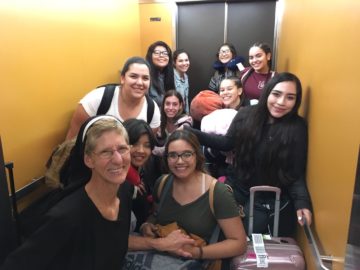As we contemplate the readings for the Twelve Sunday of Ordinary Time, please find a Franciscan Gospel reflection and questions written by Fr. Paul Gallagher, OFM for your prayer. They are edited by Franciscan Sister of Christian Charity Sister Anne Marie Lom and Joe Thiel. The excerpts from the Sunday readings are prepared by Joe Thiel. To read or download the complete pdf with excerpts for your prayer, please click here: Franciscan Gospel Reflections June 7 2020. Excerpts are from the Lectionary for Mass for Use in the Dioceses of the United States of America, second typical edition © 2001, 1998, 1997, 1986, 1970 Confraternity of Christian Doctrine, Inc., Washington, DC. Used with permission. All rights reserved. No portion of this text may be reproduced by any means without permission in writing from the copyright owner. (Photos: Camp Franciscan 2018)
Matthew 10:26-33
Jesus said to the Twelve: “Fear no one. Nothing is concealed that will not be revealed, nor secret that will not be known. What I say to you in the darkness, speak in the light; what you hear whispered, proclaim on the housetops.
And do not be afraid of those who kill the body but cannot kill the soul; rather, be afraid of the one who can destroy both soul and body in Gehenna. Are not two sparrows sold for a small coin? Yet not one of them falls to the ground without your Father’s knowledge. Even all the hairs of your head are counted. So do not be afraid; you are worth more than many sparrows. Everyone who acknowledges me before others I will acknowledge before my heavenly Father. But whoever denies me before others, I will deny before my heavenly Father.
Background:
Within Matthew’s gospel there are five major discourses. One of these deals with the mission of Jesus and the disciples (Matt 10:1-42). The first eight verses of that first discourse would have been the text for last week’s gospel, had the Church not celebrated the Solemnity of Corpus Christi. That text describes the naming and sending of the twelve.
Matthew then continues his narrative with Jesus telling the disciples how they are to travel. Jesus acknowledges the danger involved in being sent out to the towns and villages, and he asks them to rely on the Jewish code of hospitality for strangers. He directs them not to take money or provisions for themselves, and to stay at only one person’s house for the duration of their visit (Matt 10:9-15). Jesus also tells them to be prepared for rejec tion and persecution–but even if they are rejected by others, God will still be with them. He concludes by saying that a slave is not greater than the master. He implies that if He who is their master has endured rejection and harsh treatment when he was sent by his Father to be with them, then they should at least be open to similar mistreatment (Matt 10:16-25).
tion and persecution–but even if they are rejected by others, God will still be with them. He concludes by saying that a slave is not greater than the master. He implies that if He who is their master has endured rejection and harsh treatment when he was sent by his Father to be with them, then they should at least be open to similar mistreatment (Matt 10:16-25).
If time permits, it would be beneficial to prayerfully read the first 25 verses of the tenth chapter of Matthew’s gospel in preparation for your reflection on the gospel for this Sunday.
This leads into our text for this Sunday, where Jesus instructs them not to be afraid. The direct exhortation to fear no one may suggest that, for the faith-filled disciple, fear should be nonexistent. However, in verse 28, Jesus seems to acknowledge the fear the disciples might have as they face the difficulties of proclaiming what they have been taught. Jesus does not suggest that they should not be afraid; rather he tells them they should be afraid of displeasing God, who has the ability to bring upon them a pain much greater than any physical harm. Eternal life without God would be worse pain than any physical suffering they might have to endure.
Jesus then uses two images to reassure the disciples of God’s intimate concern for each of them. God’s awareness of each of the numerous sparrows and countless hairs is a reminder to the disciples that even though they may feel they are abandoned or forgotten by God in difficult times, this is not so. God is acutely aware of each of them. The hairs of one’s head are beyond being counted, yet God knows each of these. Therefore, it would be a serious mistake to give in to one’s doubts and turn from God.
Reflection Questions:
- What have been some of your fears, now or in the past?
- What effect has fear had on you and on how you live your life?
- Can you recall places in the Scriptures where God deals with the fears of the people?
- Are you familiar with psalms that speak of fear?
- Can you imagine a God who knows every hair on your head?
- What image would you use to express God’s closeness or awareness of you?
- How do you feel about God who knows you so well that God knows every hair of your head?
- What is it that is so important to God that God would ask you to face the possibility of your deepest darkest fear?
- Can you take some time now to talk with God about your fears, or how you hear God asking you to address those fears?


